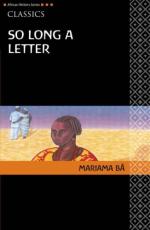
|
| Name: _________________________ | Period: ___________________ |
This test consists of 15 multiple choice questions and 5 short answer questions.
Multiple Choice Questions
1. To whom is the narrator writing her diary?
(a) Her divorced husband.
(b) Her twin daughters.
(c) Her friend, Aissatou.
(d) Her younger sister.
2. What is the mirasse?
(a) A pilgrimage to Mecca.
(b) A vision the widow finds on a quest in the desert.
(c) A payment of 10 dollars from the government for the widow.
(d) A family meeting required by the Koran where the deceased's secrets are exposed.
3. According to tradition, who stays with the narrator during this tragic time?
(a) The dead person's co-wife.
(b) All the children from all the wives.
(c) The shamen of the tribe.
(d) The deceased male relatives.
4. What keeps Mawdo busy as a physician?
(a) Finding a cure for sickle cell anemia.
(b) The population boom.
(c) The AIDS epidemic.
(d) people People now prefer western medicine to the traditional medicine.
5. Why does Modou gain many promotions in his job?
(a) He bribes those in authority above him.
(b) His father-in-law is in charge where he works.
(c) His charisma and devotion to the workers' plight.
(d) He does not accept a salary for his work.
6. What is the difference between the men and women during the gathering for the deceased?
(a) The men are loud and boisterous while the women weep quietly.
(b) The men eat but the women do not.
(c) The women talk and the men are silent.
(d) The men are dressed in native garb, but not the women.
7. How is Aunty Nabou received when she arrives at her destination?
(a) With hesitation.
(b) Like a princess.
(c) She is asked to return home immediately.
(d) With cold obligatory rituals.
8. Who suffers a heart attack?
(a) Samba Diack.
(b) Modou.
(c) Iba.
(d) Mawdo Bâ.
9. What does the narrator think of Aissatou's in-laws?
(a) That they take advantage of Aissatou.
(b) That they are wonderfully warm people.
(c) That they do not respect Aissatou.
(d) That they should not have moved to the United States.
10. According to the narrator, what did Modou do to gain her as a wife?
(a) He went to great lengths to have her.
(b) He told her father she was pregnant.
(c) Nothing, she chased Modou.
(d) He promised her they'd move to America.
11. How long does the narrator have to stay indoors after the funeral?
(a) Four months and ten days.
(b) As long as it takes for her hair to grow long again.
(c) She does not have to stay indoors.
(d) Three days.
12. What does Mawdo, Aissatou's husband, admire about his father-in-law?
(a) His dexterity and artistry.
(b) His willingness to cry at his daughter's wedding.
(c) His ability to work though he is handicapped.
(d) His prize cow.
13. To whom do the wives give money?
(a) Their children.
(b) Their in-laws.
(c) The government in the form of taxes.
(d) No one; they keep it all for themselves.
14. Who leads the country when the republic is born?
(a) The dominant political party.
(b) A dictator who is elected through corruption.
(c) The former king, who agrees to share power.
(d) A group of 15 men.
15. What does Mawdo tell the narrator about having two sons with Nabou?
(a) That he has learned to love Nabou as much as Aissatou.
(b) That he is giving the boys up for adoption.
(c) That women do not understand that men are partly driven by animal instincts.
(d) That he will now divorce Nabou.
Short Answer Questions
1. Why is the narrator upset about the donations from the people?
2. How did the men of Senegal treat an educated woman?
3. What, in the narrator's opinion, does modernity do?
4. How many years has the narrator been married to the deceased?
5. What is the name of Modou's friend who Modou introduces to the narrator and her friends?
|
This section contains 660 words (approx. 3 pages at 300 words per page) |

|




